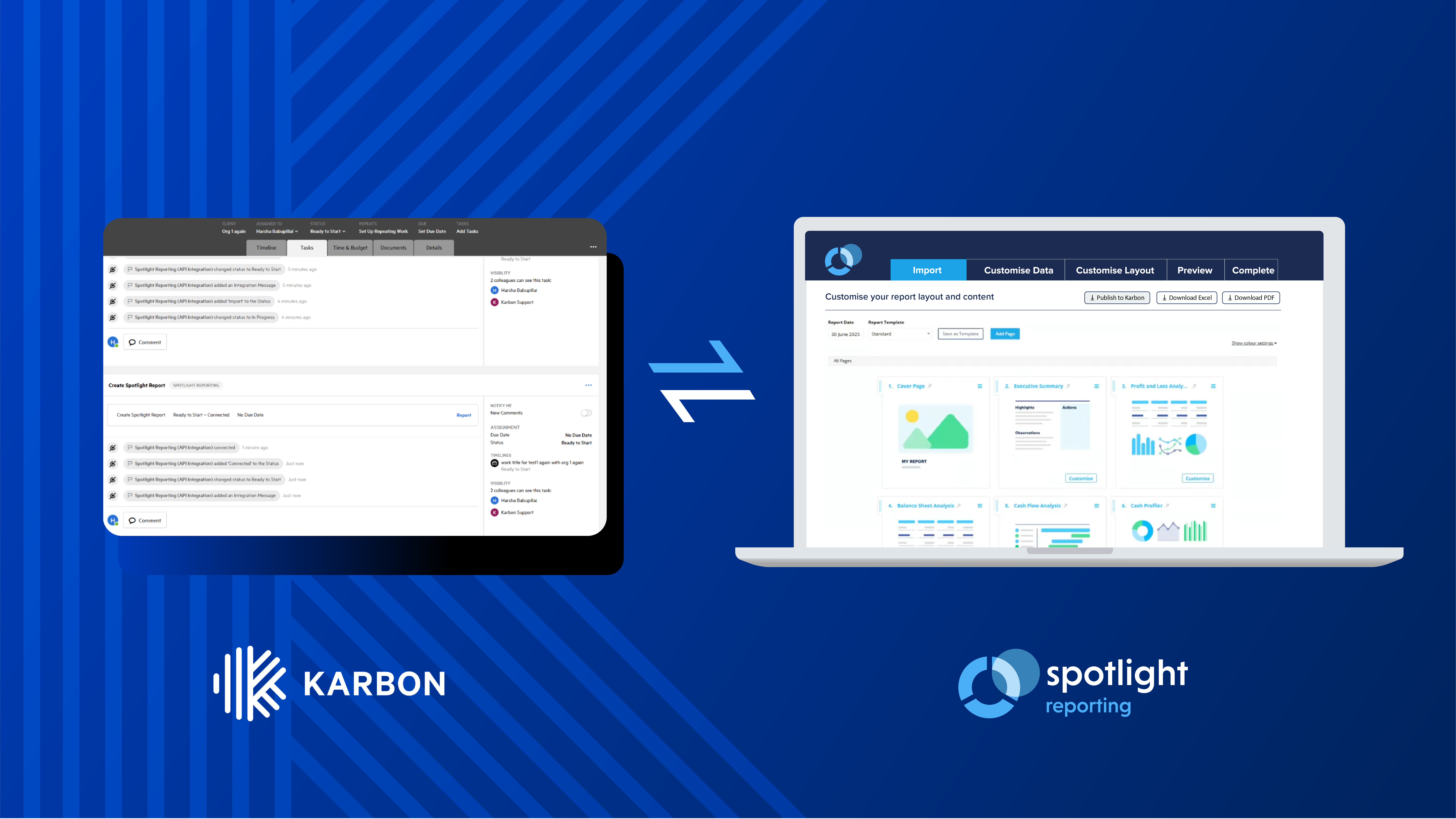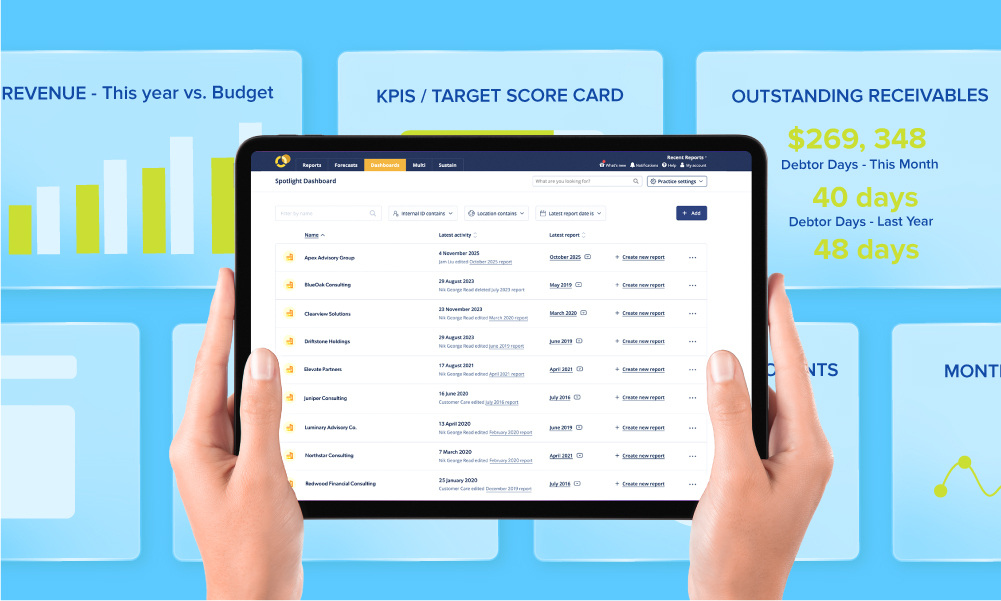I was recently lucky enough to have Paul Gardner from Fresh Accounting to join me to chat about everything from navigating accounting in 2022, how to ensure a strong team, and what non-financial KPIs tell us about a business.
Paul is the CEO of Fresh Accounting, a dynamic management accounting practice and consultancy with offices in Hong Kong and Singapore. He’s a chartered management accountant with extensive experience working with SMEs and start-ups.

Melanie: Fresh Accounting is based out of Hong Kong and Singapore. Can you walk us through what accounting looks like today versus two years ago in your world?
Paul: The last two years have been such a testing time internationally for all businesses, SMEs, multinationals and accounting firms. The main change, which hit Asia much earlier than the rest of the world, was how businesses had to have periods of lockdowns and remote working.
For those that were using Xero or Spotlight Reporting, it was business as normal, and you could work remotely. I could definitely see the challenges for older firms that were more technology resistant. It has been interesting to see businesses adopt new cloud solutions quickly so they could continue working. Cashflow was critical, ensuring customers were paying on time was critical, and ensuring we had enough money in the bank to pay salaries at the end of the month was critical. What we could see was if a business was using Excel spreadsheets or legacy software, there was difficulty in being able to piece together important information.
During the pandemic, in order to survive businesses had to have meaningful information that could be accessible from home, the had to have the ability to integrate bank feeds into an accounting systems such as Xero, if they were running a portfolio of businesses they needed the ability to do consolidated reporting for instance with Spotlight Reporting, and they still needed to maintain momentum and ensure finance teams could continue operating. Having a suite of cloud-based solutions allowed finance to continue as normal. This is where we were helping clients.
For those that were using Xero or Spotlight Reporting, it was business as normal, and you could work remotely. I could definitely see the challenges for older firms that were more technology resistant.
Melanie: We saw the same here in Australia, in that a lot of businesses and accounting firms had to adopt a different way of doing business and take on that more remote approach to be able to continue operating. The ones that quickly transitioned and grabbed on to any available technology were the ones that wouldn't have felt the impact of these lockdowns and COVID-19 as much as those that were a little bit slow on the market.
To shift focus, we understand that non-financial KPIs are becoming more important. For instance, employee satisfaction, especially during a time of mass resignations. How can a business improve employee satisfaction and to keep people happy instead of losing them to the competition?
Paul: From a perspective in Asia, certainly in Hong Kong and China, borders are still closed. So no one's using annual leave. In order to avoid burnout, we want the team to use their leave annually even though they can’t go anywhere. So if it's a public holiday on a Friday, we’ll close the office on a Thursday, and it's a four day weekend for the whole team. As everyone is off at the same time, no one has to feel guilty about it. We also encourage the team to take short breaks to recharge. This also creates a healthy, positive environment to work in.
Looking at KPIs around people using annual leave, I’ve also noticed from clients that sick leave tends to be much higher when employees aren’t happy. Alongside sick leave you can measure employee satisfaction through training and development. So when we allocate study days to the team, we’ll look to see if those study days are being utilised, as this indicates if our people are happy or not.
Melanie: At the end of the day every company has a brand image within the industry and dissatisfied or satisfied employees will put a positive or negative light on this image.
Paul: Yes, employee retention is really, really important. For all accounting firms, it's about recruitment, it's about training, it's about retention. This is how to develop a team.
Fresh Accounting is fairly unique in that we have three distinct accounting services: CFO and advisory services, which is a compliment and an extension of accounting services, and lastly the implementation or digital transformation of accounting. This is driven by Xero and Spotlight Reporting. We were one of the first Xero partners and the first Spotlight Reporting partner in Asia.
Having a team that comes in at entry level, and are able to then develop their studies and a career within Fresh, can grow from accounting to understanding and implementing software with clients. Working in an environment of SAS is also interesting, because it's constantly changing, and so we're constantly learning new things, and what works today might change next week. So it's really important to be able to have a team that can keep learning, and also pick up on the challenges and the opportunities.
Fresh Accounting is fairly unique in that we have three distinct accounting services: CFO and advisory services, which is a compliment and an extension of accounting services, and lastly the implementation or digital transformation of accounting. This is driven by Xero and Spotlight Reporting. We were one of the first Xero partners and the first Spotlight Reporting partner in Asia.
Melanie: Nothing could be more true to what you're saying than what we experienced in 2020 with the pandemic, in terms of what works one day might not work the next, and we have to find a new way of doing things just to keep going.
Paul: Yes, and this hugely plays into customers. For us, in the beginning of the pandemic we did lose a small number of clients, which was challenging to see, but at the same time we have to consider the KPI of customer satisfaction. If we're losing clients, why are we losing clients? If we're winning clients, why are we winning clients? At Fresh, we do our best to keep the clients we want to work with. We ask for testimonials, or in some instances a case study. We measure customer satisfaction in what we could be doing better.
Before the pandemic it was easy to see clients. During the pandemic, everything went to Zoom, Google Hangouts and Microsoft Teams. Accountants had to learn how to use completely new software to handle client calls. Now, regardless of whether we’re in person or calling remotely, it's really important for us to have constant communication. Again, a KPI for us is how much time we speak with a client. If a client is not happy, when we have a call we can look at how we can upsell, and also understand if a client needs additional services. When we speak to clients more frequently, those conversations allow us to continue to support them, but also be part of the journey to help them grow.
Melanie: Definitely. Especially now, a lot more accountants are in that position where they can pick and choose the clients that they want to work with, because they know the value that they're adding to that relationship. So we're starting to see less resources going to keeping difficult customers happy, and bringing on more customers that are happy to work to bring more value into the business.
Paul: I think that's right. You don't have to say yes to every potential client you meet. For all accounting firms we have to find what we excel at. We have to understand our strengths, what we’re good at, and who are the clients we can help. It's in the best interest for the customer to find the right accounting firm, so it's good for the accounting firms to be more selective. Because again, it's a relationship in which both parties have to be able to work together and communicate, and if one party doesn't feel that, then it's probably not the right fit.
You don't have to say yes to every potential client you meet. For all accounting firms we have to find what we excel at.
Melanie: You’re probably seeing that you're getting a lot pickier with the clients you do business with, to make sure that there is that synchronicity between you and them, and that you're on the same page.
Paul: Fresh Accounting, as a one partner business, from the beginning was very much focused on clients that we could handle and manage, and the industries that we were comfortable with. But as the business has grown to a team of 20 across three offices, what has been important for us is to understand the strengths and weaknesses in the team. With a larger team, we can work across multiple industries and countries, and we can take on projects that we may not have when we were first established.
That's important to look at in terms of training and development. One of the team may be very strong in project management, time and billing, and fee recognition, while another member of the team may be strong in inventory management, procurement, and supply chain. As a business, we can start to build different skill sets and offer services across different industries. That has been a huge advantage for us. Building core skills, and then developing those into new areas of revenue streams, and then learning how to standardise those new revenue streams, has been crucial.
Melanie: I expect we'll see a lot of accounting firms looking at doing business that way now, because that's what seems to be working across the board.
Paul: Coming back to the point on the Great Resignation and a happy team, one of the things that you can see from a client perspective is a lot more businesses are outsourcing. Before the pandemic businesses would commonly want to control all areas of their internal company. Now it's much harder to do that. So the outsourcing of accounting, IT, payroll or legal is becoming more the norm.
One of the words we've used right from the beginning is ‘partnering’ and building business partnerships. Now we’re experiencing more clients asking for help, and we’re building more skill sets within our team.
The challenge we can see locally, regionally and globally, is that a lot of people are changing careers and are switching jobs. So it is becoming trickier to recruit than it was before. To combat this and ensure we’re delivering the help our clients want and need, we’ve been successfully retaining our team. We’ve done this through offering bonuses right through to increasing study support and allowances.
Melanie: On the recruitment side, what can we do to bring on the right talent? Do we need to look at bumping up salary, or rewriting the job description to offer more flexibility, or offering training and reskilling opportunities? What factors are incentivising people?
Paul: With Fresh Accounting we recruit young so we can train and develop our people. Our core team has been with the business from between 6-8 years already. What that allows for a younger team to grow within Fresh and then develop the next generation of young accountants. The idea is to build out our team as a pyramid, and to allow for our people to grow within the business.
Another important focus for us has been digital transformation. For many businesses there is a sense that Excel spreadsheets can do everything. Actually, we need to look at how we can use software that allows for automation, cost management, supplier management, expense management and consolidation reporting. Overall, we want to increase and improve efficiency, allowing finance teams more time to do more important things rather than constantly chasing pieces of paper. Certainly in Asia we’re still very much paper driven, but we’re catching up. For us we’ve been helping businesses to adapt to automation, efficiency and cloud accounting. We’re in a very interesting place where more businesses, now that we’ve come though the pandemic, see that digital transformation is key.
Another important focus for us has been digital transformation. For many businesses there is a sense that Excel spreadsheets can do everything. Actually, we need to look at how we can use software that allows for automation, cost management, supplier management, expense management and consolidation reporting.
Melanie: Financial KPIs go hand in hand with non-financial KPIs when it comes to employee engagement and other measures. At the end of the day, we have to be setting ourselves up for success and ensuring that these two factors are in harmony.
Paul: Fresh Accounting is one of the very few management accounting firms here in Asia, and it comes down to monthly reporting and monthly management accounting, with profitability analysis a core focus. For instance, if we have a business in Hong Kong and a business in Singapore, the business could have a really tough quarter in Hong Kong but a really good quarter in Singapore. We need to have the ability to provide strong accounting in each city, but also to prepare consolidated reporting so we can see the bigger picture and the health of the business.
With the pandemic, a lot of businesses had to cut all unnecessary costs and navigate their survival. But as businesses come out of this, monthly management reporting, profitability analysis, customer retention, repeating customer analytics, and sales perspectives are what we need to be understanding. The ability to have KPIs in place is very important so we can see how we can have continuous improvement.
As businesses come out of the pandemic, monthly management reporting, profitability analysis, customer retention, repeating customer analytics, and sales perspectives are what we need to be understanding.
Melanie: I agree. So what would you say are the biggest learnings coming out of this pandemic?
Paul: For any business that can get through this they can get through anything else that’s been thrown at them. At the very beginning of the pandemic we had to make very difficult decisions around reducing our overheads. At Fresh we had to make one redundancy out of a team of 20, which was really tough. However, we didn’t cut salaries, and we ensured a bonus structure was in place. The key for us was to look at cutting non-necessary costs but at the same time ensuring we continued to invest in training and development.
The more profit we make the more tax we pay. So instead we put the focus on reinvesting in our businesses. We encourage our clients to do this as well and ensure that there is a return on investment in the future. In spite of challenges such as global supply chain inflation we still have to invest in our business, which means investing in our team, and our relationships with clients. That was my biggest takeaway.
Melanie: We just have to keep moving forward - as the old saying goes, “If we're standing still we’re falling behind”. Whether it’s with the adoption of cloud based platforms, retaining staff, or offering training and development, we have to keep moving forward.















